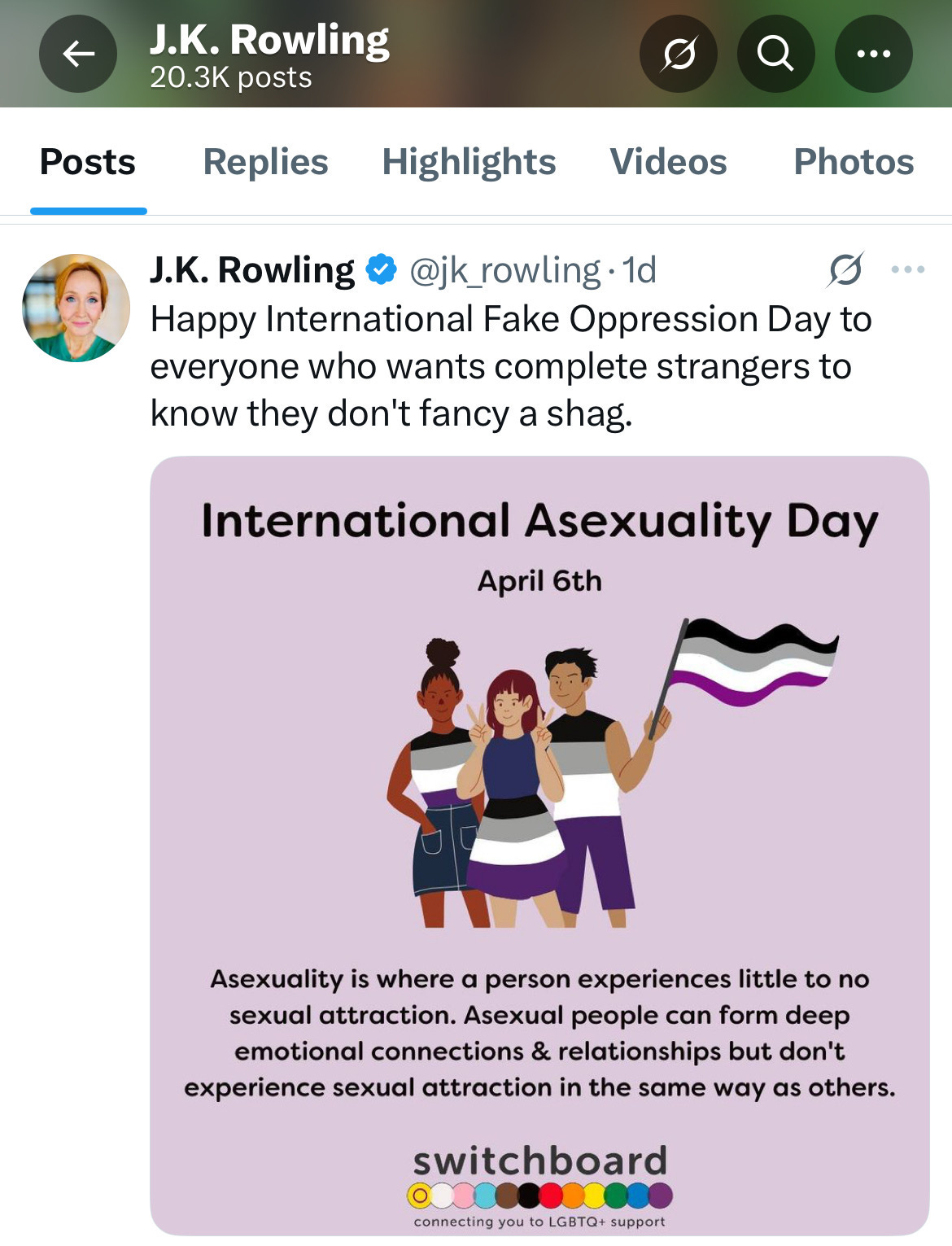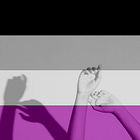And Then JK Rowling Came For the Asexuals...
Transphobia and asexuality-antagonism are linked
And then JK Rowling came for the asexuals…
“Happy International Fake Oppression Day to everyone who wants complete strangers to know they don't fancy a shag,” Rowling wrote on Twitter, in a dismissal of International Asexuality Day.
Rowling is a well-known transphobe. So her attack on asexuality isn’t surprising: there’s an established connection between anti-trans and anti-asexual attitudes.
Some asexual people have been aware of the connection between transphobia and asexuality-antagonism for years. “Scratch an acephobe, find a TERF1,” as some say.
Let’s put aside the fact that Rowling clearly has no idea what asexuality is (and is apparently too intellectually lazy to find out). Instead, I want to address a different question.
What are the connections between attacks on trans and asexual people? I won’t be able to fully answer that question in this essay, but let’s touch on some important themes.
Gender Fascism
Attacks on asexual people and trans people are united by fascist, authoritarian views on gender.
The fascist view on gender/sex is that there are only two: “man” and “woman.” Your gender is rigid, assigned at birth, and “natural.” You do not have agency over it.
Trans people come under attack by fascists because they challenge and undermine this authoritarian worldview. Attacks on trans healthcare and participation in public life are an attempt to bring people in line: your gender was assigned at birth and you must abide by it.
Under fascist regimes, a central role of women is to provide sex (and children). That’s women’s “natural” role. (It should be noted, however, that fascists are only in favor of the “right” people having babies; racial, ethnic, and religious minorities in fascist regimes often face reverse pressures, including forced sterilization.) One of men’s “natural” roles is to sire children. Thus, the attacks on asexual people.
Rowling would likely deny such an explanation, but the lineage she and other transphobes draw from is clear. Perhaps, if she spent less time on Twitter and more time in the library, she would realize this.
Against the Alphabet Soup
Many of the loudest anti-trans voices also very angry about the “LGBTQIA+ alphabet soup.”
Why? Because if the only “natural” gender identities are “man” and “woman,” then sexual identities other than straight, lesbian, gay, and bisexual are “impossible.”
Rowling is letting her true colors show a bit more in her recent antagonism toward asexuality. Her problem with queer people clearly isn’t limited to people under the trans umbrella. It’s likely she has a problem with other “fake” queer identities that deny the supposedly natural gender binary, including pansexual, nonbinary, genderqueer, fluid, agender, and intersex identities. Based on the comments I regularly receive from TERFy Rowling fans, I’ll wager she thinks the term queer is “made up” too.
Rowling may be particularly obsessed with and vocal about her antipathy toward trans people, but her attack on asexuality suggests that she’s unfriendly to many other letters in the LGBTQIA+ alphabet soup too.
“You’re Not Oppressed, I’m Oppressed!'“
Another impulse that guides anti-trans and anti-asexual attitudes is a sense that oppression is a zero-sum game.
In other words, agitators like Rowling treat oppression as a competition.
Rowling and other transphobes repeatedly make the argument that trans people (and trans women in particular) are “hurting” women’s rights.
Let’s unpack that a bit. Because banning trans people from women’s sports is such a hot button issue (despite there being under 10 trans athletes in the NCAA out of a total of over 500,000, meaning trans athletes comprise under 0.00002% of U.S. collegiate athletes), it’s easy to make the mistake that this is what transphobes like Rowling are focused on.
That’s misleading. Look again at Rowling’s anti-asexual tweet. “Happy International Fake Oppression Day,” she wrote. But International Asexuality Day isn’t about oppression. It’s about asexuality. Rowling is the one who brought oppression into the conversation.
Rowling’s attacks on trans and asexual people are fueled by a sense that liberation is a limited resource. Denying that a group is oppressed is a way of denying them a slice of that liberation.
Put another way, Rowling (and other TERFs like her) sees acknowledging the oppression of other groups as threatening the advancement of her own group: white cisgender women. Such a view of liberation is hostile to coalition building, intersectionality, and acknowledging difference.
But there’s something even more sinister and, well, foolish to this type of thinking.
Rowling and others like her are so focused on gatekeeping who gets to claim oppression that they’ve completely lost focus on the source of their own oppression.
Trans and asexual people are not the source of women’s oppression. Sexism is. And a cornerstone of sexism is telling people they have “natural,” inescapable identities that they have no control over and must abide by… which is the exact logic undergirding transphobia and acephobia.
Clinging to Victimhood
Another assumption baked into Rowling’s thinking is that being part of a marginalized group is all about victimhood.
When you look at the body of Rowling’s public comments, she does very little celebrating of women. When she does talk about women, she generally frames them as victims. In this framework, womanhood is about perpetual victimhood.
That’s a myopic view of marginality.
Existing at the margins is often accompanied by experiences of oppression. But that’s far from the whole story. In fact, I wrote an essay almost exactly one year ago explaining why it’s wrong to frame queerness as centrally about oppression. You can read that story at the link below:
Life at the margins does involve some unpleasant (and even violent) experiences, but marginality can also produce and provide community, joy, self-understanding, agency, and a sense of sparkle. There’s something deeply sad about observing Rowling’s apparent inability to see that.
But remember: Rowling and other TERFs often see liberation as a limited resource, as something that you must compete with others for. In this framework, it’s urgent to claim a monopoly on victimhood—otherwise other people might steal a slice of your liberation!
But to be clear, Rowling is also wrong in claiming that asexual people aren’t oppressed. As I’ve explained before, it’s oppressive to exist in a society that tells you you’re sick or wrong for not experiencing sexual attraction.
Many asexual people experience pathologization from medical professionals. In fact, some research shows that asexual people are more likely than any other LGBTQIA+ group to be offered conversion therapy. This often comes from therapists and other medical providers.
In some jurisdictions, marriages could be voided if not “legitimized” by consummation. Even when those legal pressures don’t exist, it’s often culturally assumed that sex is a necessary component of a “real” romantic partnership.
Those are just a few examples, but the main point is that it’s simply wrong to claim that asexual people aren’t oppressed.
Happy International Asexuality Day After All
I don’t mean this essay to be an exhaustive explanation of the links between anti-trans and anti-asexual worldviews. But I hope these thoughts can help us connect the dots between seemingly separate forms of bigotry.
I want to end, though, on a more positive note.
Rowling is clearly annoyed by the idea of asexual visibility. Ironically, she made International Asexuality Day far more visible than it would have been otherwise.
Canton Winer is an Assistant Professor of Sociology and Women, Gender, and Sexuality Studies at Northern Illinois University. His research focuses on the relationships between gender and sexuality, with specific focus on the experiences and perspectives of people on the asexuality spectrum. You can keep up with his research on Bluesky.
Want to support my research on asexuality? Consider becoming a contributing subscriber by clicking on the button above. I am committed to keeping my work free, without paywalls. Consider your paid membership a token of appreciation, an investment in research on asexuality, and a small but meaningful way to join a community that shares your interests.
TERF stands for “trans exclusionary radical feminist,” but this term is somewhat misleading since TERFs are neither radical nor feminist. Acephobe is a term used to refer to people who hold prejudicial or discriminatory attitudes toward asexual and/or aromantic people.




Thank you for writing this article and for helping to analyze the parallels and commonalities between transgender and asexual identities. I’ve read that similarly to the “compulsory heterosexuality” that many queer identities subvert, asexuality subverts “compulsory sexuality” — the notion that everyone at some level must experience sexual attraction and must fulfill hegemonic sexual expectations in various contexts like marriage, etc.
Unclear exactly why simply being the author of the “Harry Potter” series wasn’t enough for J.K. Rowling; apparently she felt compelled to further make a name for herself as a notorious TERF and acephobe as well. Totally disgraceful.
Thank you, Canton. I was...let's just say "annoyed" at JKR's little hissy fit on our day, and your essay here, especially that great clincher at the end, has cheered me up no end!